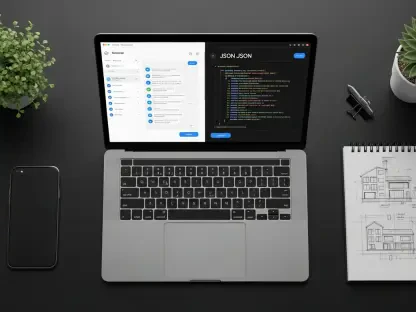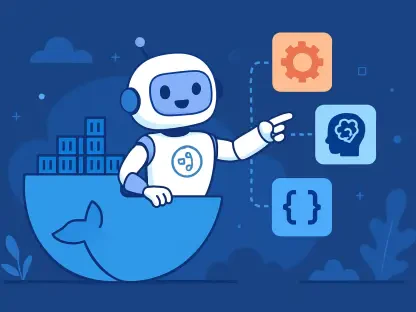Artificial Intelligence (AI) is gradually transforming the landscape of software development, offering new ways for developers to elevate productivity, streamline workflows, and minimize coding errors. As more advanced AI tools emerge, one that has garnered significant attention lately is Zencoder, an AI coding assistant finely tuned for seamless integration with popular Integrated Development Environments (IDEs) like Visual Studio Code and JetBrains. This prompts an intriguing question for developers and tech enthusiasts: Is Zencoder on the verge of becoming the next big thing in the world of AI-driven coding? To answer this, let’s dive into Zencoder’s innovative features and comprehensive capabilities to see how it stands against the competitive AI coding assistant landscape.
The Rise of AI Coding Assistants
In recent years, AI coding assistants have surged in popularity due to their ability to optimize the development process, offering features such as smart code suggestions, auto-completions, and even entire snippets based on project context. Market leaders like GitHub Copilot, Amazon Q Developer, and Tabnine have pioneered this revolution, each boasting distinct functionalities aimed at accelerating the code-writing process. Zencoder enters this competitive domain with a unique approach, presenting a rich set of tools aimed at significantly enhancing developers’ efficiency and productivity.
What sets Zencoder apart is its implementation of specialized AI coding agents, a feature that draws parallels with Solver, GitHub Copilot Workspace, and Amazon Q Developer Agent. Unlike Tabnine, which groups its agents into the main product without clear differentiation, Zencoder’s agents stand out as a flagship characteristic, potentially offering more precise and tailored coding assistance. For developers seeking to fine-tune their development experience, the specificity and adaptability of Zencoder’s agents could indeed be a game-changer, positioning it as a noteworthy contender in the AI coding assistant market.
Introducing Repo Grokking
Among Zencoder’s most standout features is a process called “Repo Grokking,” which aims to revolutionize how code generation is tailored and enhanced. Repo Grokking involves thorough analysis and comprehension of entire repositories to maximize context utilization for improving code generation, chat assistance, auto-completion, docstring generation, unit testing, and code repair. The approach is designed to capture the full scope of the codebase, creating a rich context that informs every aspect of its assistance capabilities.
The process of Repo Grokking is largely automatic. Once a user opens a Git-managed workspace, Zencoder identifies it as a codebase and proceeds to scan it, creating embeddings that are stored in a vector database for retrieval-augmented generation (RAG). Additionally, Zencoder constructs a graph representing the structure of the codebase, ensuring deep context without duplicating the workspace or compromising user privacy. As updates occur in the repository, Zencoder updates its vectors and graph, ensuring it continuously adapts to the evolving codebase, enhancing its capability for code generation, completion, repair, and chat responses.
Multi-File Reasoning and Modification
Zencoder has undergone considerable updates since its initial release, broadening its support to over 70 programming languages and offering users the capability to select from various AI models, including GPT, Claude 3.5 Sonnet, and custom models. One of the most pivotal advancements is Zencoder’s capacity for multi-file reasoning and modification. This feature is particularly valuable for larger, more complex projects, where changes in one file can affect multiple others, posing challenges for developers handling interdependent code segments.
By facilitating multi-file reasoning, Zencoder enhances its utility in larger development projects, making nuanced, context-aware suggestions and modifications that consider the entire ecosystem of the codebase. This capability is further augmented by its integration within popular IDEs like Visual Studio Code and JetBrains, ensuring a smooth workflow for developers. This multi-file reasoning not only provides a more holistic approach to code management but also significantly increases the accuracy and relevance of code suggestions, improving efficiency across extensive projects.
Error-Corrected Inference Pipeline
Zencoder distinguishes itself from other AI coding tools by employing an error-corrected inference pipeline, a multi-stage process designed to ensure accuracy in code generation. This pipeline begins by preprocessing the developer’s code to gather context and then providing this context to the AI model. The subsequent steps involve parsing and scrutinizing the code to enhance its correctness and overall quality.
This multi-step pipeline addresses a common issue with many AI tools: hallucinations or the generation of incorrect or non-functional code. By integrating these additional preprocessing and parsing stages, Zencoder aims to deliver more precise and reliable code. This emphasis on accuracy ensures that developers can trust the suggestions and changes proposed by Zencoder, potentially reducing the time spent correcting errors and improving overall code quality.
Integration and Language Support
The seamless integration of Zencoder with widely-used IDEs like Visual Studio Code and JetBrains marks another strong suit. Additionally, it boasts broad language support, including widely-used languages like Python, Java, JavaScript, TypeScript, C#, and Kotlin. Plans for full support extending to C++ and Go are anticipated soon, which will further amplify its appeal across different development environments and project types.
This extensive language support makes Zencoder a versatile tool for developers working in varied industries, from web development and mobile apps to complex backend systems. By catering to a wide array of programming needs and environments, Zencoder ensures that it holds significant relevance for a large segment of the developer community. This multi-language support makes it an adaptable tool for teams working on diverse projects, enhancing productivity across the board.
Agentic Repair and Custom Agents
A distinctive aspect of Zencoder is its “Agentic Repair” feature, designed to leverage comprehensive understanding of the codebase for tasks such as repairing code, generating complete unit tests, and resolving issues in real-time. While Zencoder’s multi-step repair agents can efficiently fix simple bugs, competitors like Solver and GitHub Copilot Workspace extend this capability further by addressing complex bugs at the whole-repo level, and generating integration tests alongside unit tests.
Additionally, Zencoder allows for a high degree of customization through its settings dialog, accessed using the Zencoder: Custom Agents command. Users are presented with predefined agents for unit test generation and coding, accompanied by a customization interface for defining specific prompts geared towards distinct tasks. This flexibility in creating custom agents enables developers to tailor Zencoder’s functionality to meet their unique requirements, thereby enhancing its effectiveness and utility in various development scenarios.
Competitive Landscape
Artificial Intelligence (AI) is steadily revolutionizing software development, presenting developers with novel methods to boost productivity, optimize workflows, and reduce coding errors. Among the emerging advanced AI tools, Zencoder has gained considerable attention. This AI coding assistant is designed to integrate effortlessly with popular Integrated Development Environments (IDEs) such as Visual Studio Code and JetBrains, prompting an intriguing question for developers and tech enthusiasts alike: Is Zencoder poised to become the next major breakthrough in the realm of AI-driven coding? To address this question, it’s essential to explore Zencoder’s innovative attributes, extensive capabilities, and evaluate its position within the competitive landscape of AI coding assistants. By examining these aspects, we can better understand how Zencoder stands out among its peers and whether it truly has the potential to revolutionize the way coding is accomplished in the tech industry.









